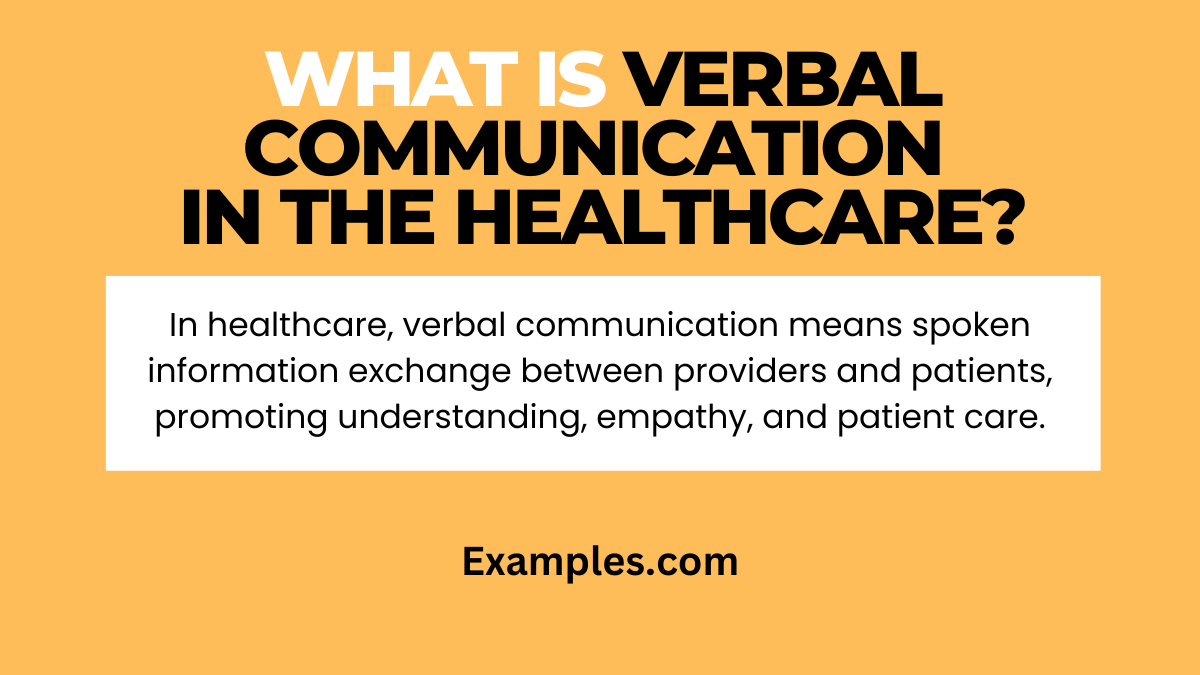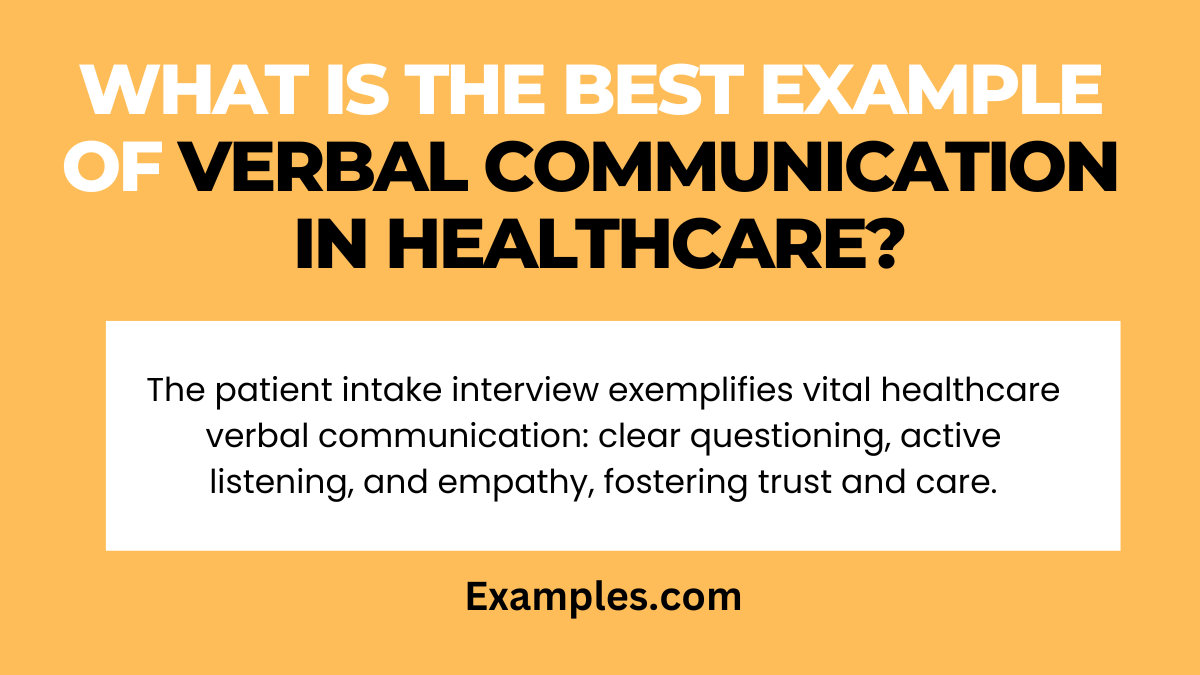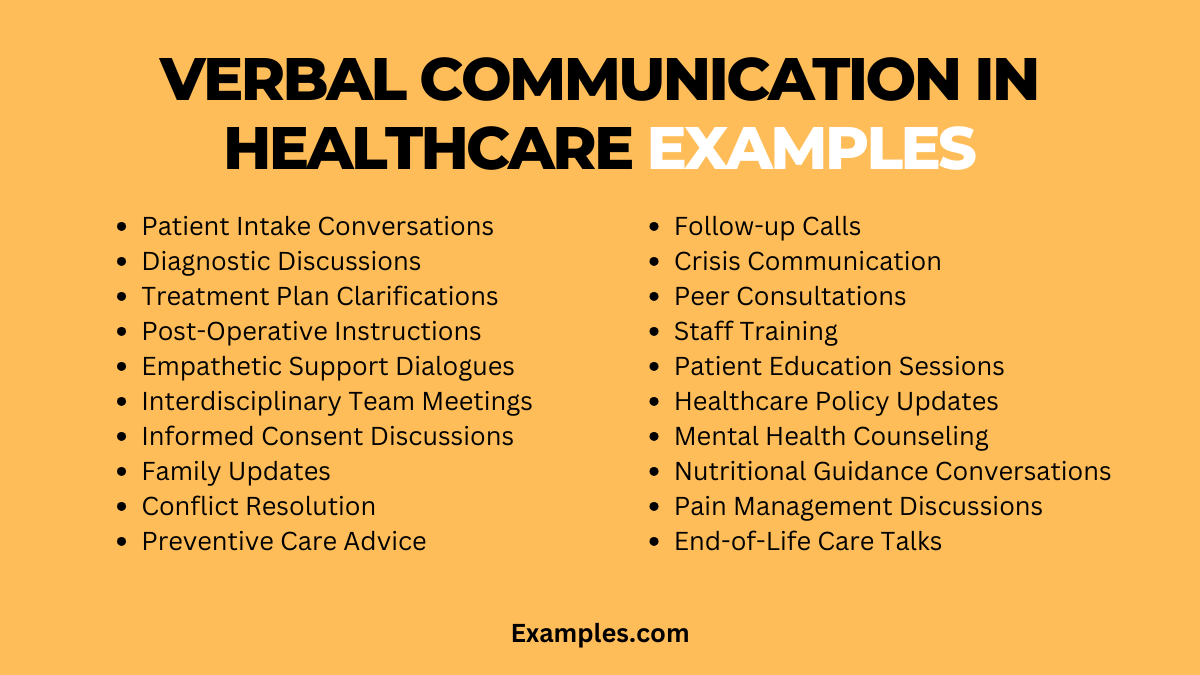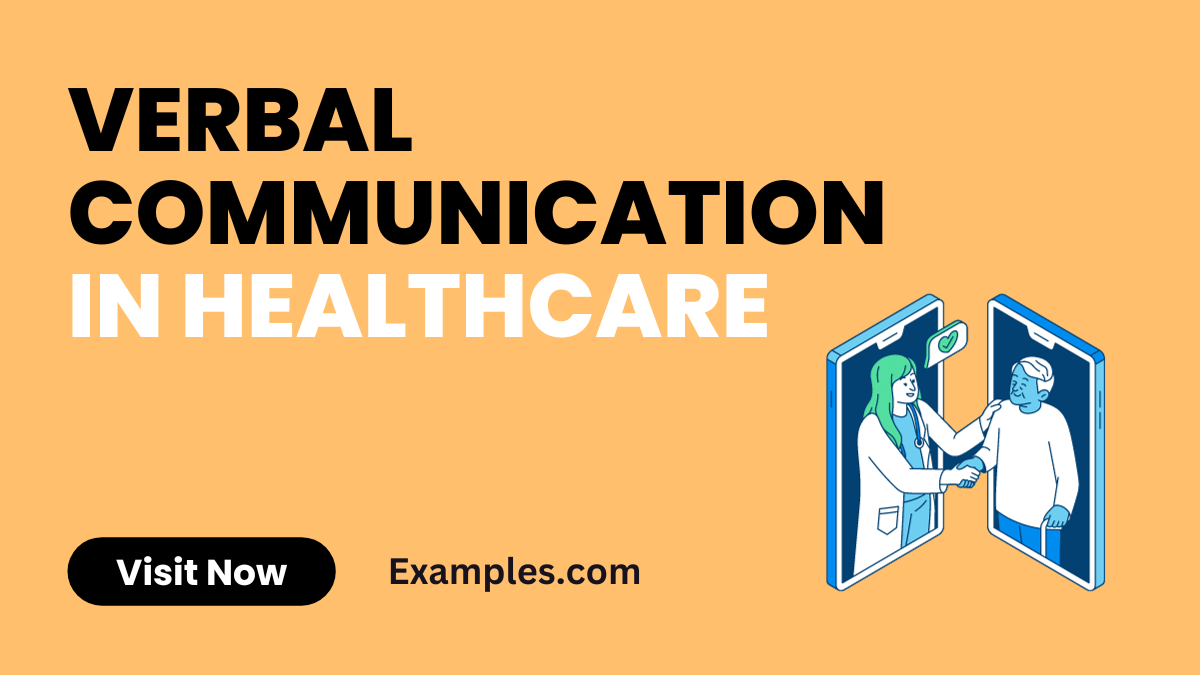19+ Verbal Communication in Healthcare Examples
Navigate the nuanced world of healthcare with our guide on verbal communication, essential for patient care. This resource is packed with Communication Examples and techniques, highlighting the importance of clear, empathetic dialogue between healthcare providers and patients. Learn how verbal cues and listening can significantly impact healthcare outcomes, enhancing both patient experience and treatment efficacy.
Download Methods of Verbal Communication in Healthcare PDF
What is Verbal Communication in Healthcare? – Meaning

Verbal communication in healthcare involves the spoken exchange of information between healthcare providers and patients. It’s a vital component of patient care, ensuring clear understanding and empathy. Effective Verbal Communication Examples include discussing treatment plans, explaining diagnoses, and providing emotional support, all crucial for patient wellbeing and safety.
What is the Best Example of Verbal Communication in Healthcare?

A paramount example of verbal communication in healthcare is the patient intake interview. During this conversation, practitioners gather essential health information, discuss concerns, and set the stage for treatment. Effective communication here involves clear questioning, active listening, and empathetic responses, setting a foundation for accurate diagnosis, patient comfort, and trust.
20 Verbal Communication in Healthcare Examples

Delve into the dynamic sphere of verbal communication in healthcare, where every word matters. This guide enriches your understanding of the Functions of Verbal Communication, explores various Types of Verbal Communication, and underscores the Advantages and Disadvantages of Verbal Communication. Learn effective Verbal Communication Techniques and how they are pivotal in patient care, team coordination, and effective management in medical settings.
- Patient Intake Conversations: Gather accurate health histories with clear questions.
- Diagnostic Discussions: Explain conditions using simple language.
- Treatment Plan Clarifications: Ensure patient compliance with understandable instructions.
- Post-Operative Instructions: Aid recovery with clear, repeated directions.
- Empathetic Support Dialogues: Offer comfort through active listening.
- Interdisciplinary Team Meetings: Facilitate understanding with standardized communication.
- Informed Consent Discussions: Simplify consent with clear explanations.
- Family Updates: Communicate patient status empathetically.
- Conflict Resolution: Manage disagreements with patient-focused mediation.
- Preventive Care Advice: Encourage health maintenance with actionable steps.
- Follow-up Calls: Check on patients with encouraging dialogue.
- Crisis Communication: Direct urgent situations with clarity.
- Peer Consultations: Collaborate on complex cases with professional language.
- Staff Training: Educate with engaging, clear instruction.
- Patient Education Sessions: Teach with relatable, simple information.
- Healthcare Policy Updates: Translate legal changes accessibly.
- Mental Health Counseling: Foster open, supportive conversations.
- Nutritional Guidance Conversations: Personalize dietary advice.
- Pain Management Discussions: Discuss options openly, addressing concerns.
- End-of-Life Care Talks: Navigate with sensitivity and clarity.
Verbal Communication in Healthcare for Nurses
Nurses are the linchpin of patient care, making their Verbal Communication Skills vital. This guide delves into how nurses can enhance their dialogue with patients, drawing parallels with strategies used by teachers and in schools to engage and educate. It discusses techniques suited for diverse patients, including those with autism, ensuring all communication is clear, compassionate, and effective, much like the structured yet caring approach required in education.
- Patient Greeting and Assessment: Nurses begin with a warm, reassuring greeting. “Hello, I’m here to care for you. How are you feeling today?”
- Medication Explanation: Nurses must explain medication purpose and instructions clearly. “This medication helps with your pain and should be taken with food.”
- Procedure Preparations: Clear instructions are given before any procedure. “I need to take your blood pressure, it will feel tight around your arm.”
- Discharge Instructions: Providing clear, concise instructions upon discharge. “Remember to take your medications as prescribed and keep your follow-up appointment.”
- Educational Dialogue: Educating patients about their health conditions. “Let’s go over what diabetes means and how you can manage it effectively.”
Verbal Communication in Healthcare for Patients
Discover the transformative power of verbal communication in healthcare for patients, enhancing understanding, comfort, and outcomes. This guide emphasizes tailored approaches for diverse patient needs, from children in school settings to individuals with autism, providing strategies to Improve Verbal Communication Skills. It illustrates how effective patient-provider dialogue can improve experiences in all Healthcare Environments, including the Verbal Communication in the Workplace.
- Receiving Diagnosis Information: “Your test results are in. Let’s go over what they mean and discuss your options.” Clarify complex medical terms and ensure understanding.
- Understanding Treatment Procedures: “Before we start the treatment, here’s what it entails and how it might feel.” Offer detailed, yet accessible explanations of procedures.
- Discussing Medication Plans: “This medication will help with your symptoms. Here’s how and when to take it.” Provide clear instructions on dosage and timing.
- Expressing Concerns and Questions: “It’s important to share any worries or questions you have about your treatment.” Encourage open dialogue to address any patient fears.
- Feedback on Care Experience: “Please tell us about your stay; your feedback helps us improve our care.” Solicit and value patient input on Healthcare Services.
What is the Importance of Verbal Communication in Healthcare?
Verbal communication in healthcare is as vital as in any high-stakes field, like law enforcement, demanding clarity and accuracy for patient well-being.
- Establishes Trust: Clear, empathetic dialogue builds trust, akin to the rapport crucial in law enforcement.
- Ensures Accuracy: Precise communication prevents errors, emphasizing the importance of verbal communication for patient safety.
- Fosters Patient Engagement: Engaging patients through clear dialogue promotes their active participation in care.
- Supports Emotional Well-being: Addressing concerns empathetically, especially for sensitive groups like those with autism, aids emotional health.
- Improves Health Outcomes: Effective communication leads to better understanding and adherence to treatment plans.
How does Effective Verbal Communication Impact Patient Care in Healthcare Settings?
Effective verbal communication is foundational in healthcare, influencing patient outcomes, satisfaction, and the overall quality of care provided.
- Enhances Understanding: Clear explanations of conditions and treatments improve patient understanding and cooperation.
- Reduces Miscommunication: Minimizing errors through clear instructions and confirmations mirrors the rules of verbal communication in critical professions.
- Promotes Continuity of Care: Consistent and clear verbal exchanges ensure seamless transitions between healthcare providers.
- Supports Informed Decisions: Empowering patients with information helps them make informed choices about their health.
- Encourages Compliance: Effective communication increases the likelihood of patients following through with treatments and medications.
How is Verbal Communication Used in Healthcare?
In healthcare, verbal communication is vital for doctors, nurses, and staff to interact effectively with patients, explaining diagnoses, offering comfort, and sharing crucial medical information. It’s equally critical in specialized areas like verbal communication for students, autism, and school settings.
What are Good Verbal Communication Skills in Healthcare?
Effective verbal communication skills in healthcare encompass active listening, empathy, clarity, and the ability to tailor communication to the unique needs of patients. These skills are essential in specialized contexts such as verbal communication for students, verbal communication for autism, and verbal communication for school environments
What are the Consequences of Poor Verbal Communication in Healthcare, Especially in Critical Situations?
In healthcare, poor verbal communication can lead to serious consequences, including medical errors, delayed care, heightened patient anxiety, and potentially life-threatening situations. This holds true across all healthcare domains, areas like Verbal Communication for Business, verbal communication for Teachers, Effective communication is imperative for ensuring patient safety and well-being in these contexts.
In conclusion, the impact of verbal communication in healthcare is undeniable. It affects patient outcomes, staff collaboration, and overall healthcare quality. Recognizing the nuances between verbal vs. written communication and verbal vs. oral communication is essential. Effective verbal communication leads to better patient care, reduced errors, and enhanced relationships. Recognizing signs of poor communication and implementing solutions is crucial for improving healthcare delivery.



